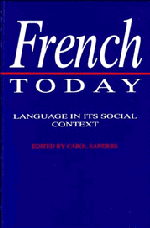Book contents
- Frontmatter
- Contents
- List of figures and maps
- List of tables
- Notes on the contributors
- Acknowledgements
- Introduction
- 1 French: a planned language?
- 2 Sociosituational variation
- 3 Regional variation in France
- 4 The other languages of France: towards a multilingual policy
- 5 The migrant languages of Paris
- 6 Gender and language in French
- 7 The reform of the writing system
- 8 Alternative French
- 9 New words for new technologies
- 10 Language and style in politics
- 11 French and French-based Creoles: the case of the French Caribbean
- 12 French in Africa
- 13 French in Canada
- 14 Sociolinguistic variation and the linguist
- Bibliography
- Index
10 - Language and style in politics
Published online by Cambridge University Press: 05 June 2012
- Frontmatter
- Contents
- List of figures and maps
- List of tables
- Notes on the contributors
- Acknowledgements
- Introduction
- 1 French: a planned language?
- 2 Sociosituational variation
- 3 Regional variation in France
- 4 The other languages of France: towards a multilingual policy
- 5 The migrant languages of Paris
- 6 Gender and language in French
- 7 The reform of the writing system
- 8 Alternative French
- 9 New words for new technologies
- 10 Language and style in politics
- 11 French and French-based Creoles: the case of the French Caribbean
- 12 French in Africa
- 13 French in Canada
- 14 Sociolinguistic variation and the linguist
- Bibliography
- Index
Summary
In representative democracies (if not in all polities maintained by conventions and practices other than brute force alone) politics is essentially a question of language, that is to say, of thousands upon thousands of linguistic utterances and exchanges which take place in the context of an elaborate set of generally accepted conventions: a civil servant functions as the skilled user of a particular language; a politician, via the framework of an electoral campaign or parliamentary procedure, wins support by means of what he or she says; a diplomat sustains or negotiates international relations by employing a highly charged but very restricted code of euphemisms; and so on (comparative and contrastive claims can be made for lawyers, trade unionists, television reporters, indeed for all political and social actors).
Language acts to maintain, challenge or effect changes within the political status quo; and the relationship between political language, convention and ritual is of crucial importance here. Ritual normally constrains participants who wish to effect change. Occasionally, however, language within ritual can bring about significant change (the brilliant speech in the National Assembly which swings the vote, the emotional appeal at conference which saves the party from scission, and so on).
- Type
- Chapter
- Information
- French TodayLanguage in its Social Context, pp. 185 - 198Publisher: Cambridge University PressPrint publication year: 1993

